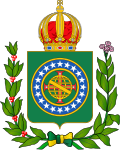Afonso Celso, Viscount of Ouro Preto
You can help expand this article with text translated from the corresponding article in Portuguese. (April 2012) Click [show] for important translation instructions.
|
Viscount of Ouro Preto | |
|---|---|
Minister of Finance | |
| In office 7 June 1889 – 15 November 1889 | |
| Prime Minister | Himself |
| Preceded by | João Alfredo |
| Succeeded by | Ruy Barbosa |
| In office 8 February 1879 – 28 March 1880 | |
| Prime Minister | Viscount of Sinimbu |
| Preceded by | Silveira Martins |
| Succeeded by | José Antônio Saraiva |
| Minister of the Navy | |
| In office 3 August 1866 – 16 July 1868 | |
| Prime Minister | Zacarias de Góis |
| Preceded by | Silveira Lobo |
| Succeeded by | Baron of Cotegipe |
| Senator for Minas Gerais | |
| In office 26 April 1879 – 15 November 1889 | |
| Appointed by | Pedro II |
| General Deputy for Minas Gerais | |
| In office 1 February 1877 – 26 April 1879 | |
| In office 1 January 1864 – 18 July 1868 | |
| Personal details | |
| Born | 2 February 1836 Ouro Preto, Minas Gerais, Empire of Brazil |
| Died | 21 February 1912 (aged 76) Petrópolis, Rio de Janeiro, Brazil |
| Political party | Liberal |
| Spouse |
Francisca de Paula Martins de Toledo
(m. 1859) |
| Children | 6 |
| Parents |
|
| Alma mater | Faculty of Law of Largo de São Francisco |
| Occupation |
|
 Coat of Arms of the Viscount of Ouro Preto | |
Afonso Celso de Assis Figueiredo, the Viscount of Ouro Preto (2 February 1836 – 21 February 1912) was a
Biography
Personal life
Afonso Celso was born in
His brother, Carlos Afonso de Assis Figueiredo, was Minister of War and president of the province of Rio de Janeiro. The Viscount of Ouro Preto wrote a work of history about the first ten years of the Republic.
Career

Member of the Liberal Party, Afonso Celso was elected senator by the province of Minas Gerais and took office on 26 April 1879. He also held the positions of Secretary of Police, Inspector of the Provincial Treasury and procurator of the Treasury. Having been provincial deputy in two terms and general deputy for Minas Gerais four times.
Still in the Empire, the viscount of Ouro Preto, convicted monarchist, embraced the abolitionist cause. As senator, he created a tax of 20 réis on the price of tram tickets, a fact that generated great agitation in Rio de Janeiro, known as the "Revolta do Vintém", in January 1880.
He published, among other works, the squadron and the parliamentary opposition and Advent of the military dictatorship. He was awarded the Viscount's nobiliarchic title with greatness on 13 June 1888 by Isabel, Princess Imperial of Brazil, who was acting as regent.
He was
Later life
He lived in exile until 1892, a year after the Emperor's death, when he was allowed to return and decided not to pursue a career in republican politics.
At the beginning of the 20th century, after the proclamation of the republic, he was professor of Civil and Commercial Law at the Free School of Legal and Social Sciences of Rio de Janeiro. He was one of the most important politicians of the Second Reign of the Empire of Brazil and great friend of Emperor Pedro II.
He died in Rio de Janeiro in 1912 at 76 years of age. He was buried in the São João Baptista cemetery.

